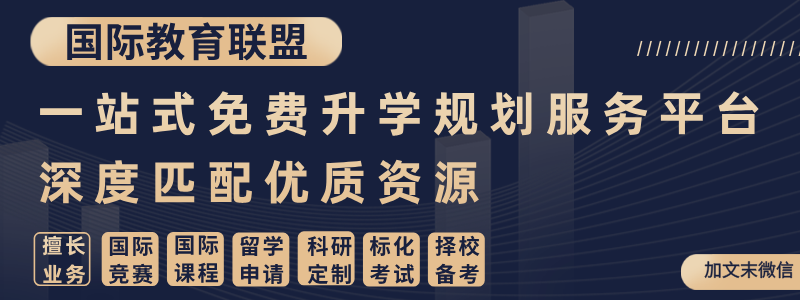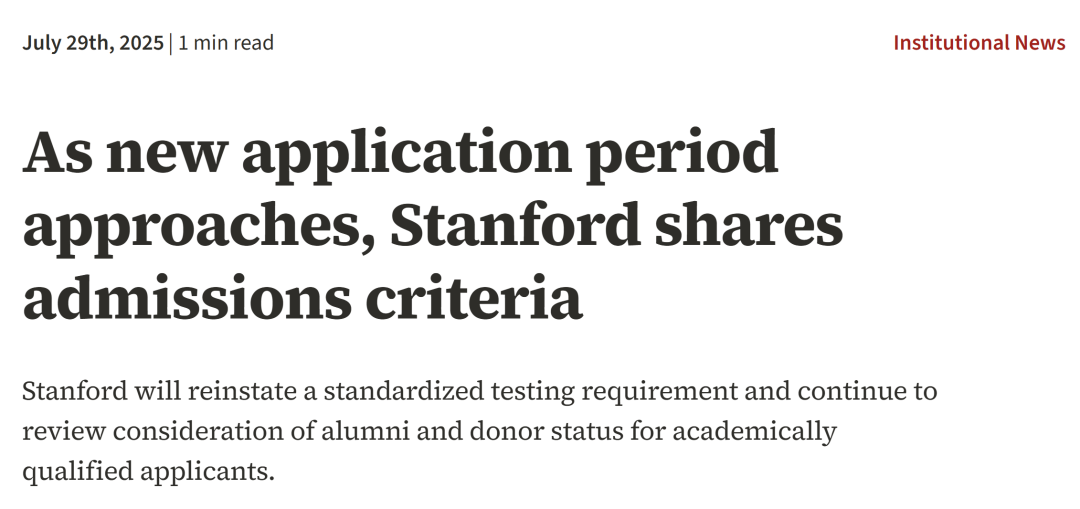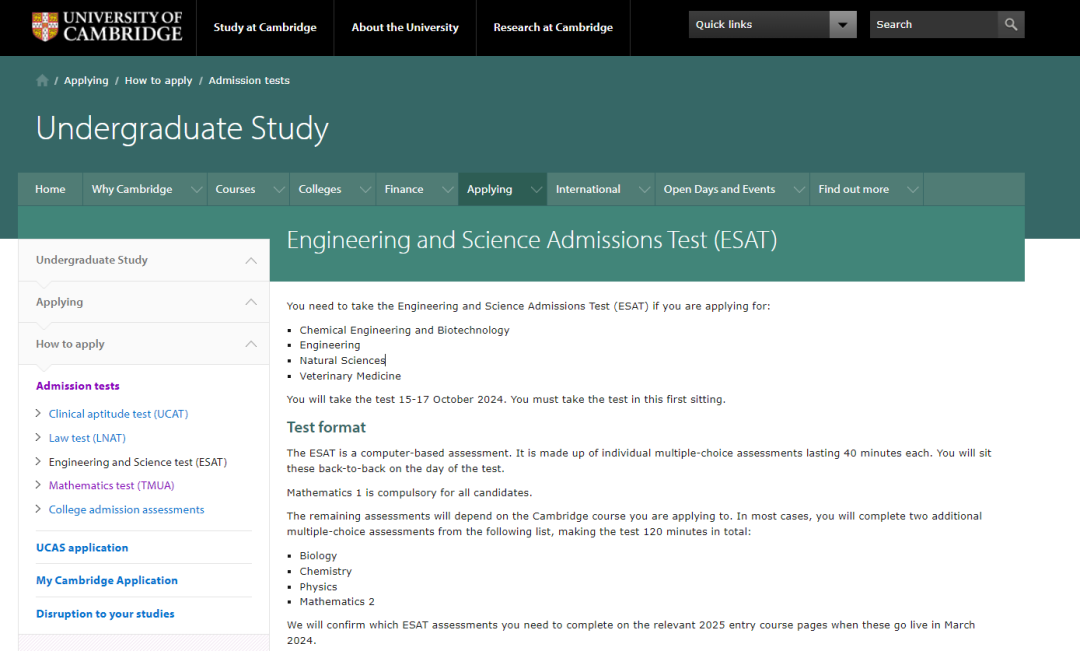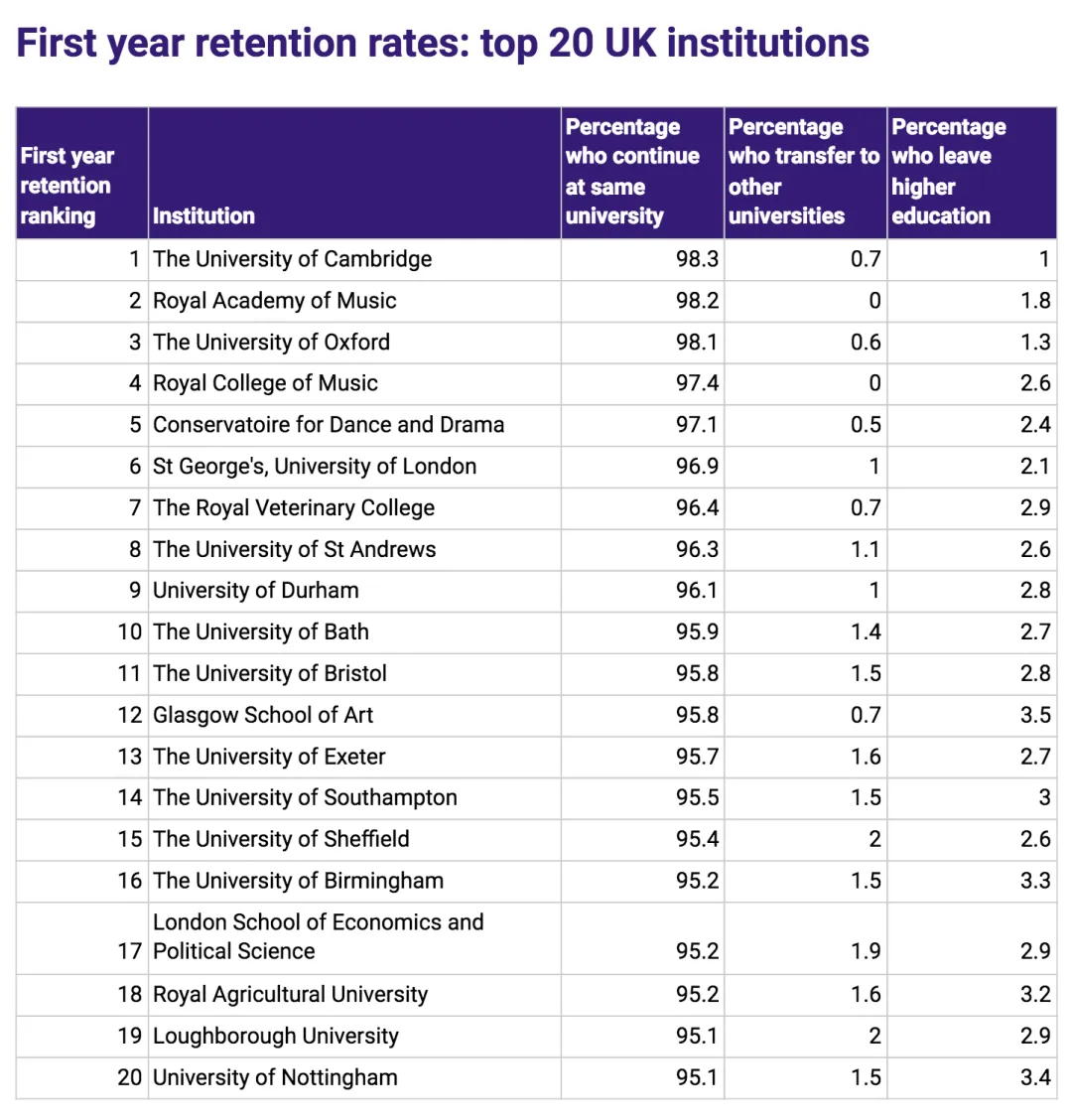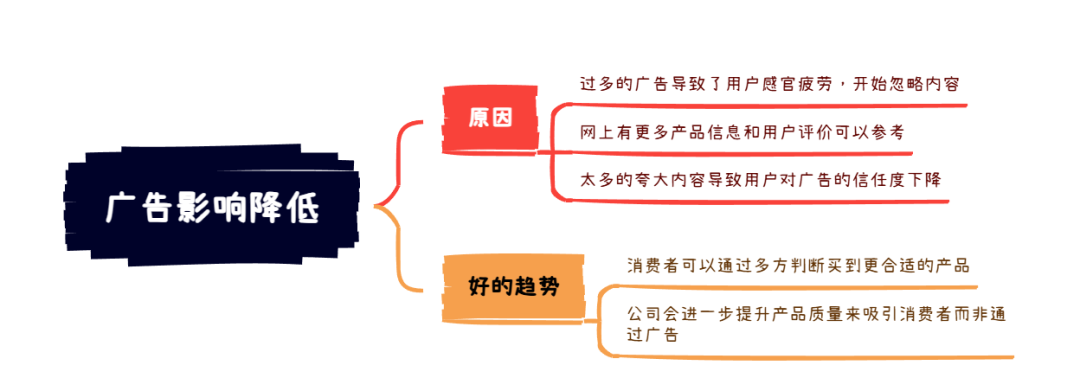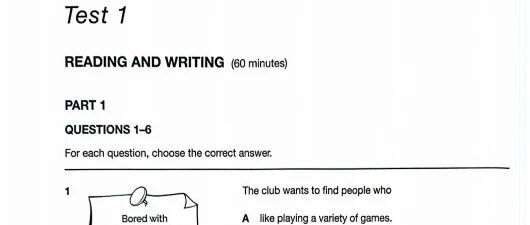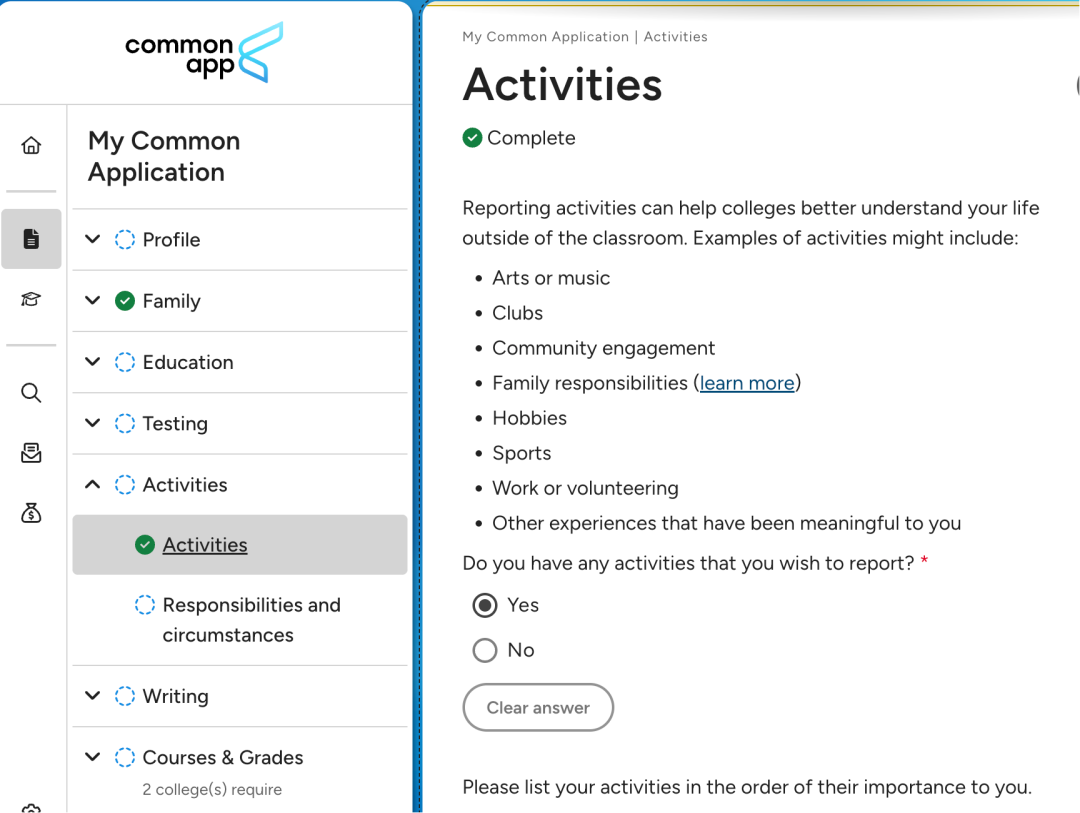前几天给大家陆续整理了港大提前批家庭财富管理、会计学、市场营销、全球管理专业视频面试的要点:
8h极限提交?港大FWM专业视频面试问题解析!
港大会计学视频面试问题解析!如何在90s内打动面试官
面邀即录取?港大市场营销视频面试问题解析!
录取门槛暴涨?港大全球管理视频面试问题解析!
收到港大面邀=稳了吗?拆解不同专业的真实发放逻辑
港大26fall提前批经济学的面试邀请来啦!🎉
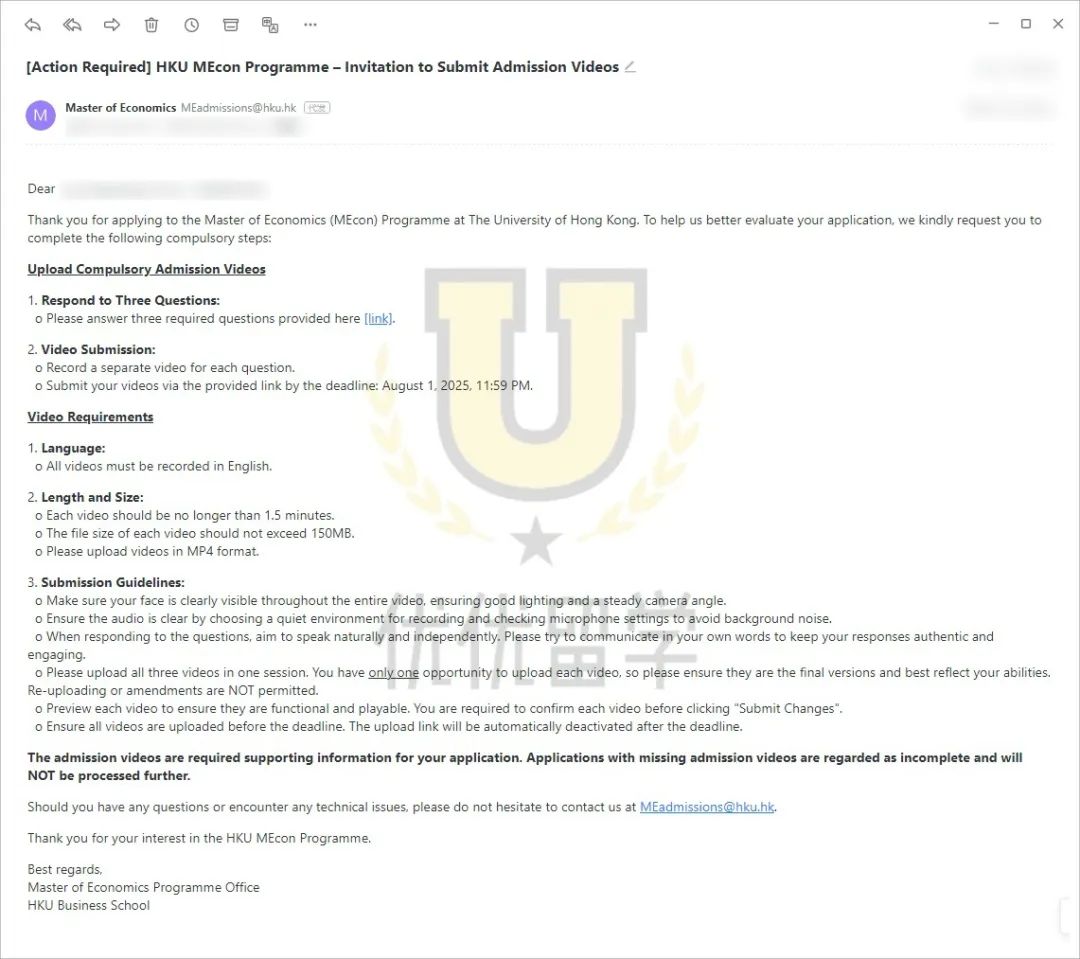
(递交申请后收到的邮件通知)
面试题目速览:
Q1: What is your long-term career goal? (你的长期职业目标是什么?)
Q2: The most difficult undergraduate course and why? (你觉得最难的本科课程是什么?为什么?)
Q3: How do you define success? (你如何定义成功?)
从我们的数据来看,经济学项目是目前发面邀比例最高的项目之一,我们学员中接近一半都收到了video面试邀请。
更重要的是,这个项目的筛选标准非常明确:
- 985高校、财经类211背景且本科均分85+的申请者,几乎都获得了面邀
- 跨专业申请者只要条件达标,同样能进入面试
- 即使985/财经类211背景,均分不到85也普遍被拒
结合这些数据,我们的初步判断是:经济学项目初筛阶段分数导向明显,只有达到硬性门槛的申请者才会收到面邀。
因此,如果你收到了面试邀请,基本可以理解为"已通过初筛",后续面试表现正常的话,录取可能性很高。
【格式要求】
递交申请后大约48小时内完成,3个视频,每个不超过1.5分钟和不超过150MB,必须是MP4格式。
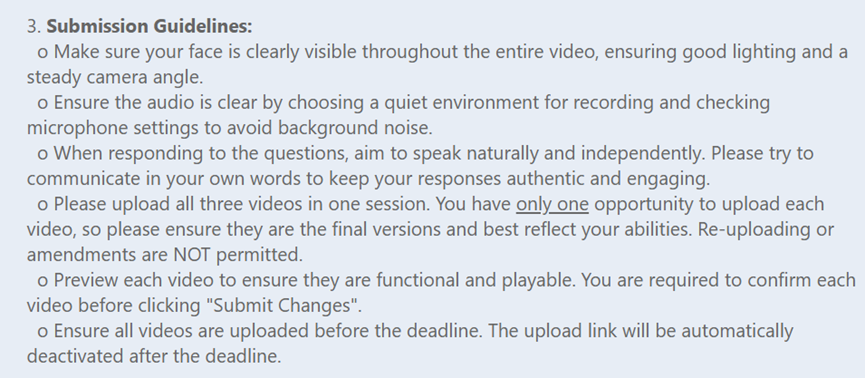
(一些general提醒)
【核心要点】
经济学面试是经典的港大video三题模式,每个人的题目不一样。如何差异化回答,让面试官记住你是关键!
核心要点:
① 要根据经济学专业方向选择合适的素材;
② 港大商学院特别看重匹配度,你的故事一定要个性化和详细,差异化的故事线才能让面试官记住你;
③ 要体现独特的软实力故事,避免落俗套,杜绝回答同质化;
④ 三个问题会全方位考察你的不同能力;
⑤ Video面试也在考察表达逻辑和自信从容的面试状态;
【问题分析及应对策略】
【问题1】
What is your long-term career goal?
你的长期职业目标是什么?
这道题考什么:
考察你对经济学应用的理解和职业规划。
怎么回答:
- 先点题:说明你想长期解决的经济问题类型(比如企业定价策略、政策效果评估、城市发展议题等)
- 举个相关经历:分享你处理类似问题的经验,说明你的分析思路:✅ 把复杂问题拆解成可检验的经济学问题(明确变量和假设)✅ 选择合适的分析方法(回归分析、倍差法、工具变量、实验设计等)
- 展示成果:给出一份能被实际使用的结论
- 连接未来:说明在硕士阶段会继续深化,做成可复现的分析工具和项目
问题1回答示例:
My long-term goal is to become an applied economist who helps firms and institutions make decisions with evidence, not just intuition. Studying Finance & Banking in Hong Kong gave me a front-row seat to how companies operate inside a broader financial ecosystem, how exchange rates, payment rails, regulation and market structure shape day-to-day choices. Through internships and projects, I moved from ‘knowing cases’ to building simple economic frames for pricing, working capital, and exposure to macro shocks.
At your programme, I want to formalise that into a repeatable toolkit: framing questions clearly, applying micro and macro theory where they actually bite, and using econometrics to separate noise from signal. The programme’s emphasis on frontier developments, discussion-based learning, and the Hong Kong-China vantage point is ideal for me.
In the next five to seven years, I see myself in a strategy or research role, translating models into product, market, and policy recommendations. Over time, I want to lead teams that publish decision-grade analysis and mentor younger analysts on turning data and theory into choices that improve resilience and growth.
【问题2】
The most difficult undergraduate course and why?
你觉得最难的本科课程是什么?为什么?
这道题考什么:
考察你的学术思维和解决复杂问题的能力。
怎么回答:
- 总结难点:说明课程的核心挑战,比如"难在准确识别和严谨分析,不是计算公式"
- 两步分析法:✅ 明确识别策略(固定效应、倍差法、工具变量、实验设计等,解释为什么选择这种方法)✅ 做稳健性检验和可视化(换不同口径、分析异质性、用图表解释不确定性)
- 展示结果:说明最终结果的特点(结论边界清楚、代码可复现等)
- 学习收获:这让你在硕士学习中更注重方法匹配和研究的可重复性
问题2回答示例:
The toughest course for me was Applied Econometrics, because it forced me to move from tidy textbook logic to messy data and credible identification. Our group project studied how FX movements affect import-heavy SMEs in Hong Kong. We built a panel of SKU-level costs and monthly exchange rates against ASEAN currencies, and specified a fixed-effects model to see pass-through into unit costs.
The hard parts were data cleaning and identification, price changes also reflect promotions and supplier renegotiations. To address that, we added product and monthly fixed effects, controlled shipping proxies, and ran robustness checks with alternative baskets. I led the codebook and reproducible scripts, plus a visualisation that compared predicted versus actual cost movements during shock windows.
We didn’t ‘prove’ everything, but we produced a defensible story: pass-through is partial and slower for contract-based items. The course taught me to respect assumptions, document choices, and communicate uncertainty. That discipline is why I’m excited about your focus on connecting theory to real-world business, especially in courses like Applied Econometrics and International Macroeconomics and Finance.
【问题3】
How do you define success?
你如何定义成功?
这道题考什么:
考察你的价值观和对经济学研究价值的理解。
怎么回答:
- 给出定义:提出你的成功标准,比如"能被实际采用的分析才叫真正成功"
- 具体说明:详细分析什么是好的经济学研究:✅ 问对问题、选对方法✅ 给出实际可用的输出(政策建议、行业简报、可复现的实验等)
- 价值体现:说明"被采用程度和影响指标"的重要性
- 未来应用:关联到项目学习和毕业后如何实现这样的"可交付成果"
问题3回答示例:
I define success as asking important questions and answering them in a way that others can use. In practice, that means three things. First, clarity, turning a broad issue into a precise, testable economic question. Second, credibility, choosing methods that fit the question, reporting limits, and making the work reproducible. Third, consequence, translating findings into decisions for businesses or policymakers.
Within your programme, my markers of success are concrete: complete core analytical modules and produce two or three decision-grade memos, say, an FX-exposure note for HK SMEs, a short policy brief on a China-Hong Kong topic, and a replication with an extension from a published paper. I also want to present at least once in a seminar setting to stress-test my reasoning.
If I graduate having built a portable toolkit, micro, macro, and econometrics, that I can apply across markets, and a habit of writing analyses that leaders actually act on, that’s success to me. It aligns perfectly with the programme’s goal of equipping students with state-of-the-art analytical tools in a real-world context.
【视频录制注意点】
【内容框架(以90秒为例)】
○ 开场陈述(5-10秒):直奔主题,明确表述观点或经历。
○ 具体事例(60秒左右):讲述简洁、有细节,体现个人亮点。
○ 收尾总结(15秒左右):强调你从经历中获得的能力,或与你申请该专业的关联度。
【语言表达】
○ 英文表达清晰、语速适中,避免用太复杂的长句,结构清楚易理解;
○ 语气积极、真诚、自信,适度使用强调词,增强说服力。
【视觉与仪态】
○ 穿着正式得体,面部表情自然,眼神有交流感;
○ 视频背景干净简洁、光线柔和均匀,避免杂乱或光线不足;
○ 避免明显阅读或背诵稿件感,流畅自然为佳。
【文件大小与格式】
○ 提前检查视频大小,尽量控制在120MB左右避免上传问题;
○ 视频导出后仔细检查音质画质;
○ 系统上传后有preview检查的操作,且上传速度较慢,一定要确保上传系统后再播放一遍视频确认流畅度。
(自行录制)
(采访录制风格)
(纪录片风格)
【小建议汇总】
1. 录制后剪辑可以加一个跟随字幕,便于审理老师更好的理解你的内容;
2. 剪辑成稿时也可以在视频最下方设计制作一个视频进度条,网上搜一搜教程特别多;
3. 学校的logo可以加或不加,但别忘了在视频的角落标记自己的姓名和申请号哦!
最后提醒一下大家,准备时要注意避免照搬模板,面试官更看重的是你独特的经历和真实的故事。通过具体的例子来展示你的能力,特别是技术能力和软技能的结合,这样才能让面试官印象深刻~


